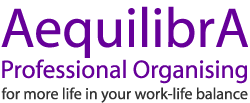
Our environment affects us negatively or positively, often more than we realise.
When that environment is our working environment, it can hinder or enhance our productivity and therefore raise or lower our stress levels.
Creating an environment that is both functional and comfortable can be a challenge.
It can be an even bigger challenge when that environment is shared; we each have different preferences about lighting, heating, ventilation, aesthetics and so on, and a different tolerance to the distracting aspects of noise. Whether your working environment is at work, at home, or on the road, getting organised and managing your resources can go a long way to improving your productivity and reducing stress.
Location Location Location
Many people operate in a disorganised and counter-productive environment. They can't find the equipment and resources they need when they need them, either because they're hidden amongst clutter or because frequency of use, accessibility and workflow haven't been considered when deciding where to locate them.
Comfort is as important as functionality. Lighting, heating, ventilation and noise levels are aspects of our environment that can affect our productivity and our mood. We can also be influenced to a degree by the aesthetic aspects of our surroundings: colour, furnishings, even 'atmosphere'.
Whilst some people are content to work in less appealing environments, others prefer, or even need, an aesthetically pleasing one. It's a question of personal taste but we can all benefit from having a working environment that is a place that we're happy to be in.
A Productive Environment
A productive environment is one that enhances, not impedes, the flow of work. The more frequently we use something the closer it needs to be but we still need some space to work in. We need to consider frequency of use and accessibility when locating equipment and resources.
It makes sense to 'keep like things together' and store supplies near to associated equipment. When the photocopier runs out of paper we all expect to find boxes of it stacked up nearby, and the photocopier itself is usually sited in a central, accessible location.
We follow the same principles at home; most people keep the tea, coffee and sugar near to the kettle, and the cleaning products under the sink, because it makes sense. If we apply these principles to all of our equipment and resources it can enhance the flow of work.
Clutter-Free & Organised
Most people would admit that their homes contain a certain amount of clutter; those things that no longer have a place in our lives that we've neglected to get rid of for a variety of reasons. Workplaces have clutter too. Duplicated and obsolete information is an example of workplace clutter; filing cabinets bursting with reference information that is never referenced and bookshelf contents doing nothing more than gathering dust.
A clutter-free and organised environment is a more pleasant place to be, whether it's purpose is for work or leisure activities. Decluttering to eliminate the unnecessary and organising what's left can help to streamline your environment.
On the Road
Managing your working environment is more difficult when the environment is a moving one! Many people work 'on the road' so the car, the train, or the airport lounge becomes their working environment.
'Hotdesking' is increasing in popularity; some people have to work on the move but don't have a desk of their own to come back to when they are in the office. With hotdesking, workers have to remain mobile, taking their 'kit' with them and using a vacant desk.
It requires a greater level of organisation to be able to settle quickly into a new working environment, work productively while you're there, and pack up your kit when you've finished.

